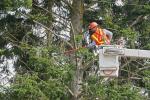
When tree-care workers operate from either a lift bucket or climb trees, there’s no margin for error when working around power lines.
The perils were demonstrated earlier this month when a 47-year old owner of a tree-trimming business in Pennsylvania fell 20 feet to the ground from his lift truck after being shocked when he came in contact with power lines while trimming trees.
Or the tree trimmer in California who was electrocuted while pruning walnut trees from a bucket truck on a family-owned farm when his pruning shears touched the high-voltage power lines that crossed over the orchard just above the treetops. The worker died instantly.
The biggest factors in most of these accidents, according to Peter Gerstenberger, senior advisor for safety, standards and compliance for the Tree Care Industry Association, is the assumption by homeowners that the contractor they hire has the expertise to perform the work safely.
“Homeowners should make sure they are hiring qualified tree-trimmers before starting any work,” said Gerstenberger. “They are properly trained which builds competency and awareness, helping reduce the possibility of accidents. Also, contact the utility company before starting any work.”
Grounds maintenance workers, including tree trimmers, have a fatality rate that is more than three times that of the average worker in the U.S., according to the U.S. Bureau of Labor Statistics. Nearly 600 people died in tree-trimming accidents from 2009 through 2015 according to the TCIA, with electricity contributing to 15 percent of all fatalities.
Gerstenberger added that since January 2015, there have been 274 occupational fatalities, 41 of which were exposure accidents with some sort of electrical contact. Contact with single-phase primaries, un-insulated tools and/or conductive tree branches, and un-insulated lifts were prominent factors in these accidents.
“Working around power lines is dangerous, especially when trimming trees. These accidents show there is danger anytime tree-trimmers or homeowners attempt to trim trees from around power lines,” said Rick DelaHaya, Gulf Power spokesperson. “We recommend homeowners observe the 10-foot rule and not attempt to work on trees that are within 10 feet of any kind of overhead wires. This distance ensures they won't touch any live wires.”
Gulf Power can assist property owners with tree trimming when trees interfere with power lines. When a tree trimming request is received, Gulf Power will inspect the location and explain what the company can do to assist. Assistance may include temporarily de-energizing or removing electric wires that may be hazardous to the workers while the trimming or removal is being done.
“If a tree is within 10 feet of an energized power line, we can assist the customer by removing a portion of the tree for them to make it safe, and then a tree-removal contractor who is trained to work around power lines could be hired to finish the job,” said DelaHaya. “It can be highly dangerous, and a more complicated job than homeowners think.”
Before trees even become a problem to power lines, Gulf Power reminds homeowners and landscapers to plant the “Right Tree in the Right Place.” Planting the right tree in the right place may help decrease the likelihood of power outages in the event of a storm while ensuring power lines are clear of trees and brush.
“While planning any tree planting, we ask customers to be mindful of energy infrastructure and to consider the future growth of the tree when identifying a safe planting spot,” said DelaHaya. “As trees grow, their branches and roots spread out, so avoid planting them too close to overhead power lines or over underground electric lines. Trees planted at the right height help to minimize the possibility of power outages, electrical contact and downed lines.”
Trees that grow too close to power lines can challenge the delivery of safe and reliable energy service for customers along with the safety of the public and Gulf Power employees. Gulf Power will trim trees along rights of way when necessary to trees that could possibly interfere with power lines that can cause outages and create potentially hazardous situations.
“Gulf Power’s tree-service contractors are certified line clearance specialists,” said DelaHaya. “They are trained to know the proper techniques and safety measures for trimming trees near power lines.”
It’s always best to leave tree trimming near power lines to trained experts. When hiring someone to do the trimming, make sure they follow these safety practices recommended by the OSHA’s line-clearance tree-trimming requirements including receiving specialized training and maintaining the proper minimum-approach distance. Other safe practices include:
- Determine the voltage(s) of any lines that may pose a hazard before work begins. All lines must be considered as operating at the voltage of the highest-voltage line.
- Contact the energy company to discuss de-energizing, grounding or shielding power lines.
- Perform a hazard assessment of the work area before starting.
- Do not trim trees in dangerous weather conditions, such as high winds, icing, or thunder and lighting.
- Only use insulated tools and equipment to remove branches and limbs.
- Wear approved personal protective equipment, including gloves, hard hats, hearing protection, non-conductive clothing and harnesses as needed.
- Use extreme caution when moving ladders and equipment around downed branches and power lines.
- Inspect trees and limbs for structural weakness before climbing or cutting.
Visit Gulf Power for additional safety tips for working around power lines. You can also contact Gulf Power at 1-800-225-5797 and ask to speak to a local utility arborist.
###
About Gulf Power
Gulf Power serves more than 460,000 customers in eight counties throughout Northwest Florida. The company’s mission is to safely provide exceptional customer value by delivering reliable, affordable and environmentally responsible energy while strengthening our communities. Visit online at MyGulfPower.com or on the company’s Facebook, Instagram and Twitter pages. News information can be found at GulfPowerNews.com
News Media Contacts:
Rick DelaHaya
Media Relations850.872.3205, cell 318-294-2338
Kimberly Blair
Media Relations
850-444-6050, cell 850-206-5132
GordonPaulus
Media Relations
850.444-6320, cell 850-525-7510